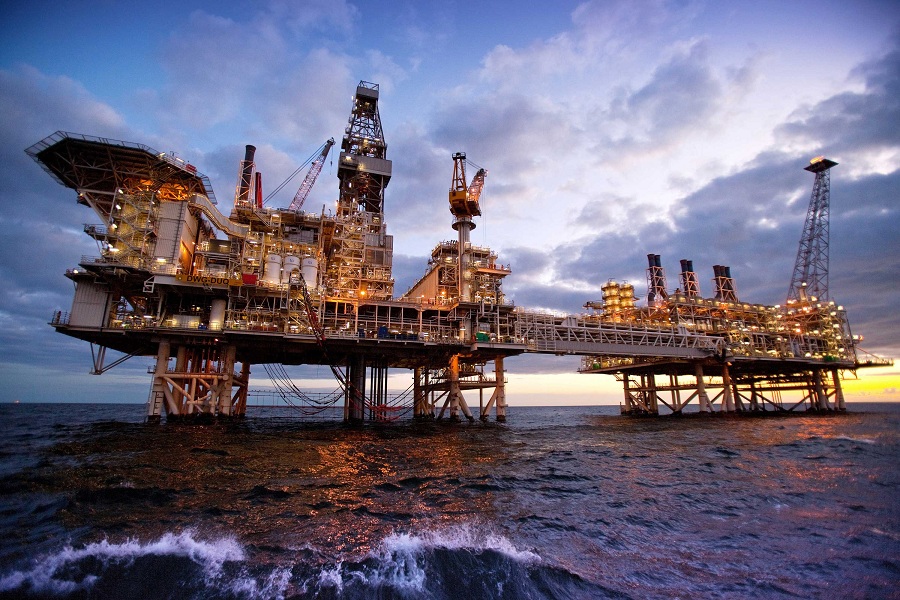Azerbaijan has renegotiated a long-standing agreement with the consortium of eleven oil companies led by British Petroleum (BP) to develop the Azeri-Chirag-Guneshli (ACG) offshore oilfield, the largest undersea field of its kind in the Azerbaijani sector of the Caspian Sea.
“A new era of development of the ambitious Azeri-Chirag-Gunashli oil field is beginning,” Azerbaijan’s President Ilham Aliyev said at a signing ceremony held at the Heydar Aliyev Center in Baku on Thursday.
The new production sharing agreement envisages extending the current agreement, signed in 1994, to 2050 and basing it on more profitable terms and conditions for Azerbaijan.
“The new contract . . . is even more profitable for Azerbaijan,” President Aliyev said. “This time the contract is signed on the best terms.”
As a result of the new deal, Azerbaijan will receive a $3.6 billion bonus from its international partner companies in the ACG project. The State Oil Company of the Azerbaijan Republic (SOCAR) will now hold a 25 percent stake in the project, up from 11.6 percent, giving the company the right to receive more dividends and more votes when making important decisions. Income going to the state budget from direct oil sales after recovering costs will be 75 percent, surpassing last year’s 60 percent.
The ACG field had been known about but unexplored since the early 1970s, when Azerbaijan was one of 15 republics comprising the Soviet Union. The USSR dissolved in December 1991, and by 1994 the newly formed and sovereign government in Baku announced that Azerbaijan’s portion of the Caspian would be opened for exploration.
Located about 120 kilometers (75 miles) off the coast of Baku, the Azeri-Chirag-Gunashli field was the first to be developed by the Republic of Azerbaijan. On September 20, 1994, the first production sharing agreement was signed between its government and 11 foreign companies, including BP; Amoco, Unocal, Exxon and others from the US; and foreign companies representing Russia, Turkey, Norway and Saudi Arabia.
Dubbed “the contract of the century” by the signatories, the deal was Azerbaijan’s first major post-Soviet investment from Western multinationals. BP had held the largest share in the project, at 35.8 percent, and was responsible for the oilfield’s operation on behalf of the Azerbaijan International Operating Company (AIOC), established in February 1995 following the ratification of the production sharing agreement.
The agreement that was in place for 23 years had served its parties well. The ACG produced 436 million tons of oil, which allowed Azerbaijan to generate $125 billion from oil sales.
“When the contract was signed in 1994, the estimated oil reserves [in ACG] were determined at 511 million tons,” Aliyev said on Thursday. “However, today's data. . . shows that there are still approximately 500 million tons of undeveloped oil reserves in the Azeri-Chirag-Gunashli.”
The new agreement revises the shareholdings of all parties involved. While Azerbaijan’s SOCAR gains, foreign companies will have less. BP’s share drops to 30.37 percent, Chevron’s from 11.3 to 9.57, INPEX from 11 to 9.31 percent, Statoil from 8.6 to 7.27, Exxon Mobile from 8 to 6.79, TP Petroleum from 6.8 to 5.73, ITOCHU from 4.3 to 3.65, and ONGC Videsh Limited from 2.7 to 2.31 percent.
Azerbaijan, a country located on the western edge of the Caspian Sea bordering Russia to north and Iran to the south, is rich in oil and natural gas. According to data compiled by the US government, its proved oil reserves are estimated to be seven billion barrels, or about 955 million metric tons, putting it at number 20 globally and ahead of India, Norway, Sudan, and the EU.
The ACG field is responsible for around 80 percent of Azerbaijan’s total overall crude oil production. As of July 2017, ACG’s output stood at 631,500 tons, according to data compiled by SOCAR. Oil extracted from the offshore field is delivered via a subsea pipeline network to the Sangachal terminal, located 55 km south of Baku. From there, the processed oil gets pumped to foreign markets through the Baku-Supsa, Baku-Novorossiysk and Baku-Tbilisi-Ceyhan pipelines.
In a country where, 59 percent of the government’s revenues come from oil sales, including oil exported to countries like Italy, France, Germany, Israel, the US and India, the ACG field is critical to the Azerbaijan’s economic and national security.
“The extension of the agreement is of key importance for the development of the oil sector of Azerbaijan after 2024,” Laura Bennie, a Caspian region analyst with the British consulting firm Wood Mackenzie said in a statement issued on Thursday.
“Production at ACG can now be below 600 thousand barrels per day, but it is possible to extract billions of more barrels and invest billions of dollars,” Bennie said.







 Russian peacekeeping forces, deployed in the Karabakh (Garabagh) region of Azerbaijan since 2020, have commenced their withdrawal from the area.
Russian peacekeeping forces, deployed in the Karabakh (Garabagh) region of Azerbaijan since 2020, have commenced their withdrawal from the area.
 Azerbaijan officially unveiled the logo for the upcoming 29th session of the Conference of the Parties to the United Nations Framework Convention o...
Azerbaijan officially unveiled the logo for the upcoming 29th session of the Conference of the Parties to the United Nations Framework Convention o...
 The Kazakh authorities have increased their arbitration claims against international oil companies involved in the development of the Kashagan oil ...
The Kazakh authorities have increased their arbitration claims against international oil companies involved in the development of the Kashagan oil ...



